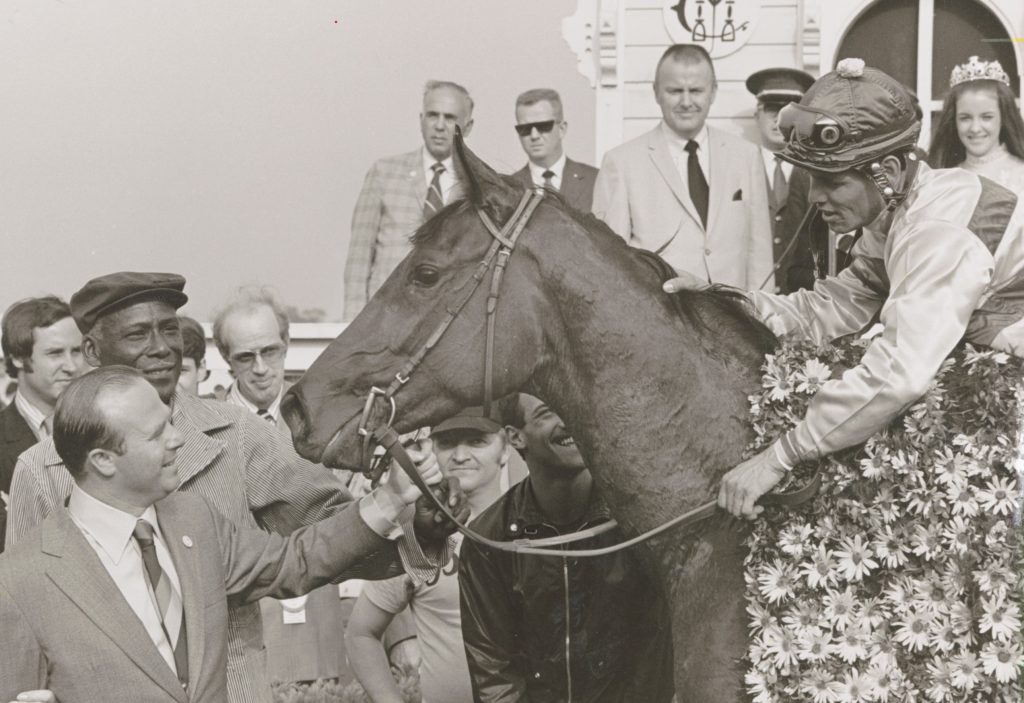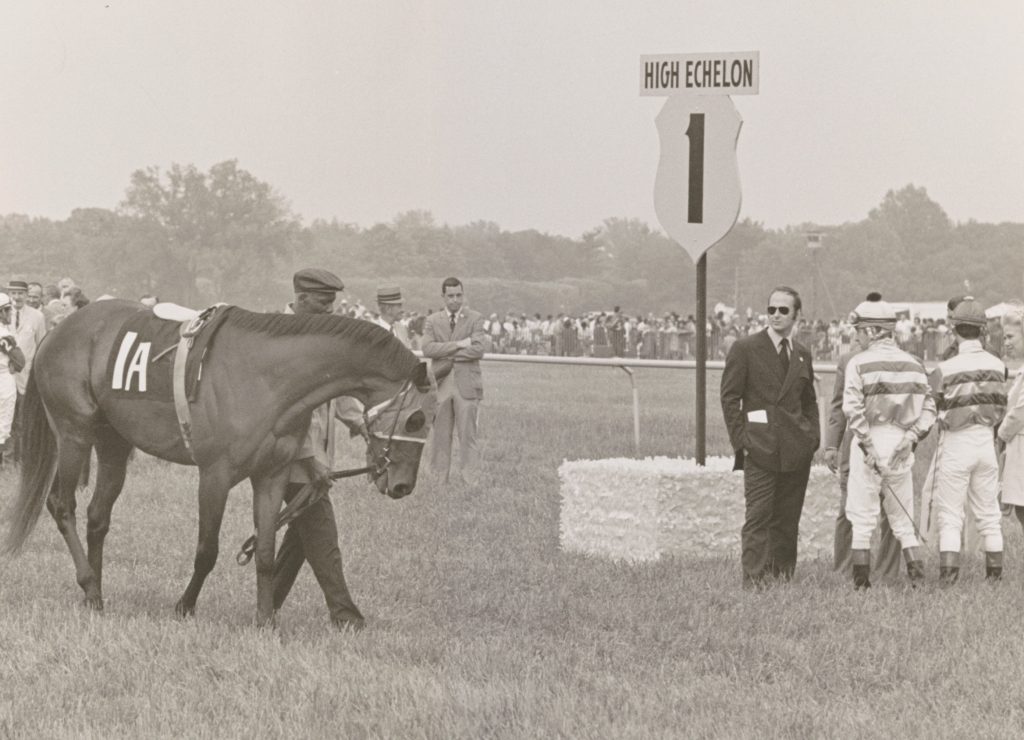
Photo Credit: “Keeneland Library Thoroughbred Times Collection”
The new year renews our focus on the Triple Crown classics, the familiar names from 2019 now older and a fresh crop of three-year-olds ready to greet us on the track. Before the battle for Kentucky Derby points begins in earnest, this first part of 2020 gives us the opportunity to take a look back at who came before, the horses that made those years special just as this new crop of sophomores can make this year a memorable one as well. Fifty years ago, in 1970, the Triple Crown races were ones that were full of horses like Dust Commander, High Echelon, and a colt named Personality.
Initially, the milestone of fifty years ago prompted me to research who won the classics that year. Like most years, three different horses won each classic; heck, you can’t have a double classic winner or a Triple Crown winner every year, gaps between those notable horses dotted with seasons without a dominant springtime horse. Personality caught my eye immediately because of his connections: bred by Isidroe Bieber and Hirsch Jacobs, owned and raced by Ethel Jacobs, Hirsch’s wife, with the trainer of record as John Jacobs, Hirsch’s son. Personality’s glory, though, belonged to the Hall of Fame trainer who had bred and trained both Hail to Reason and Affectionately, Personality’s sire and dam.

Hail to Reason was a Bieber-Jacobs collaboration, sired by the Irish stallion Turn-To out of their homebred mare Nothirdchance. His eighteen starts at age two included nine wins, including the Hopeful, the Tremont, and the Sanford Stakes. Hail to Reason was Jacobs’s best Derby hopeful yet until he stepped on a horseshoe during a workout and fractured both sesmoid bones in his left foreleg. Hirsch Jacobs’s quick thinking saved the colt’s life; he would never race again, but at least he could stand stud. At Hagyard Farm, Hail to Reason sired Halo, Bold Reason, Proud Clarion, and Personality among others.
Personality’s dam was Affectionately, a champion sprinter and handicapper, an extraordinarily talented filly who beat the boys on a regular basis. The plain bay Personality was her first foal, her best foal. Personality showed such potential that Hirsch Jacobs told his son John, who had followed in his footsteps to become a trainer as well, that High Echelon, the stable’s best-known Derby hopeful in early 1970, would have his chances to win, but the year would belong to Personality. Known for taking a $1,500 claimer named Stymie and making him the richest horse of his era, Jacobs’s instincts about this colt made Personality one of the favorites going into the 1970 Kentucky Derby.
It took the colt a few starts to get to the point of favoritism in America’s most famous race. Troubles with the colt’s ankles and shins meant that his two-year-old season consisted of only one start in late October 1969. In a six-furlong maiden race at Aqueduct, Personality finished ninth in a field of fourteen and did not start again until late January 1970. He finished third in that maiden race before going on to win his next two starts, one at six furlongs where he led wire-to-wire and the other at seven furlongs where he went from last at the start to first in the stretch and then won by 3 ½ lengths.
John Jacobs promoted Personality to the stakes ranks with starts in the Everglades and then the Flamingo Stakes at Hialeah. The colt finished fourth in both of those starts and then was fourth again in the Bay Shore and Gotham Stakes at Aqueduct. With only three weeks to go before the Kentucky Derby, John Jacobs put Personality in a seven-furlong allowance race as a tune-up for the Wood Memorial on April 18th. Personality won by five lengths, setting up a battle with Silent Screen and other Derby hopefuls.
Coupled with High Echelon, Personality was second choice at 5-1 for the Wood Memorial. In a full field of fourteen, Personality nearly went to his knees as the field charged for the first turn. Jockey Eddie Belmonte helped the colt recover his feet, moving the colt from fifth to third behind Silent Screen and Delaware Chief. In the stretch, the three colts were running head-to-head, three across the track. With a sixteenth of a mile to go, Belmonte drove Personality to the front, taking the race by three-quarters of a length. Hirsch Jacobs had passed away eight weeks before the Wood Memorial, but the faith he had shown in this son of Hail to Reason and Affectionately paid off. Personality would lead the way to Louisville.

In the end, though, the roses eluded the late Hirsch Jacobs one more time. Despite being the sentimental favorites to win the Kentucky Derby, neither of the Jacobs’s horses was able to beat Dust Commander. High Echelon rallied in the stretch to finish third; Personality, stuck in the auxiliary gate in post 16, was positioned to make a move in the stretch, but was bothered by puddles on the track, causing the colt to weave and lose the momentum Belmonte was trying to use at the end. The roses might not have been theirs to take home, but the Jacobs pushed on to Baltimore, to Pimlico, and the second jewel of the Triple Crown two weeks later. Personality got a much more favorable post position, breaking from post two, with his stablemate High Echelon next to him on the rail. The prognosticators were focusing on Personality, confident that he was ready to better his Derby performance. John Jacobs echoed that confidence, despite High Echelon’s third place in the Derby. Personality was rounding into form while High Echelon remained a bit of a wild card, his high strung nature making him a question mark. Despite that high esteem, the Jacobs entry went off at 5-1, behind the favorites Dust Commander and My Dad George.
At the start, Eddie Belmonte took Personality back, hanging out mid-pack as the field made their way around the first turn and then onto the backstretch. Preserving the colt’s energy for the onslaught on the final turn, Belmonte sat chilly on Personality, picking off horses one by one as the front runners started to fade in favor of the closers. By the top of the stretch, Personality was second, only Silent Screen in front of him. The two hooked up in the stretch, running together for a few strides, before Silent Screen gave into the pressure, allowing Personality to take the lead. Under Belmonte’s urging, Personality held on to his slim lead as My Dad George made his bid on the rail. With My Dad George gaining on him with each stride, the Jacobs colt drifted out toward the middle of the track a bit, but found the finish line first, bobbing a long neck in front at the wire. The plain bay homebred colt, the last of the horses Hirsch Jacobs would ever breed and train, had won a Triple Crown classic, rewarding Jacobs’s faith that Personality was the best horse he had ever had in his barn.
Three weeks later, it would be High Echelon, not Personality, carrying the Jacobs’s silks into the winner’s circle at Belmont Park. After winning the Jersey Derby, Personality had spiked a fever before the Belmont Stakes, knocking him out of the race and leaving his stablemate to bring home another classic for the Jacobs family. Personality returned to the races later that summer, taking the Jim Dandy at Saratoga and then beat older horses in the Woodward in October before calling it a year. He also faced older horses in the Stymie Handicap (the race named for Hirsch Jacobs’s most famous and richest horse), finishing second, and placed fourth in the Travers Stakes. At year’s end, on the strength of his performances in 1970, Personality was selected as Horse of the Year by the Thoroughbred Racing Associations and finished second to Fort Marcy in the Daily Racing Form’s Horse of the Year polling. The split between Personality and Fort Marcy for Horse of the Year honors was part of the impetus to create the Eclipse Awards, which were first awarded the following year.
At four, Personality’s best finish was second in the Excelsior Handicap at Aqueduct and was retired in June 1971, a sinus condition keeping the colt from showing his best. He stood at Gainesway Farm in Lexington, Kentucky, with limited success, and was eventually sold to a Japanese breeder. This plain bay son of Hail to Reason and Affectionately died in 1990 at age twenty-three. Even though he did not sire another horse of his same quality, Personality does go down in history as Hirsch Jacobs’s first classic winner, a horse so special to Jacobs that the trainer carried a photo of the colt in his wallet.
The Jacobs’s family’s involvement with the Triple Crown did not end with Personality and High Echelon in 1970. Daughter Patrice married Louis Wolfson and, under the banner of Harbor View Farm, won the Triple Crown in 1978 with Affirmed. John Jacobs transitioned from trainer to bloodstock agent, Personality and High Echelon his only brushes with classic glory.
Fifty years on, rather than look back at 1970 as just another year with a different horse winning each of the classics, think instead of Personality’s win in the Preakness as a milestone win, posthumously rewarding a trainer who had given so much of himself to the sport of horse racing with something that had eluded him in life. To read more about Hirsch Jacobs and his remarkable Hall of Fame career, pick up Tony Ryan Book Award winner Out of the Clouds by Linda Carroll and David Rosner.



